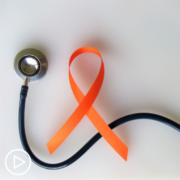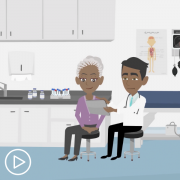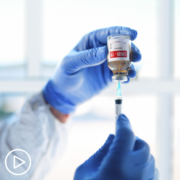What Is CAR T-Cell Therapy for Myeloma?
What Is CAR T-Cell Therapy for Myeloma? from Patient Empowerment Network on Vimeo.
How does CAR T-cell therapy work to treat myeloma? This animated video provides an overview of the CAR T-cell process, explains which patient this treatment could be appropriate for, and reviews potential side effects.
See More From Innovative Myeloma Therapies
Related Programs:
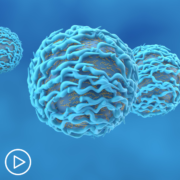
|
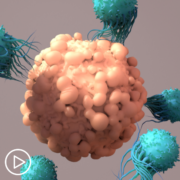
How Is CAR T-Cell Therapy Changing the Myeloma Treatment Landscape? |

|
Transcript:
CAR T-cell therapy is a type of treatment in which a patient’s own immune system cells, also known as T cells, are reprogrammed in a laboratory to attack cancer cells.
The process involves removing T cells from the patient’s blood. Then, the T cells are sent to a laboratory where a gene for a special receptor that binds to a protein on the patient’s cancer cells is added to the T cells. The special receptor is called a chimeric antigen receptor.
When this process is complete, the cells are put back into the patient’s body by infusion. The altered T cells then attack and destroy cancer cells in the patient’s body.
In myeloma patients, the FDA-approved CAR T-cell therapies recognize a protein called B.C.M.A. on the surface of myeloma cells.
Now that you know how CAR T-cell therapy works, who is CAR T-cell therapy right for?
- While still a new treatment, CAR T-cell therapy is currently approved for people with relapsed or refractory multiple myeloma who have already received four or more lines of therapy.
While every patient reacts differently to CAR T-cell therapy, some of the potential side effects may include:
- Cytokine Release Syndrome, which occurs when the immune system responds to infection or immunotherapy drugs more aggressively than it should. Symptoms may include fever, nausea, fatigue, and body aches.
- Another potential side effect is neurotoxicity, which may cause negative effects on the nervous system such as confusion, difficulty speaking or understanding, loss of balance or consciousness, tremors and seizures.
- And blood count recovery can be slower following CAR T-cell therapy.
So, what should you ask your doctor about CAR T-cell therapy?
- Is CAR T-cell therapy available at this cancer center?
- Is CAR T-cell therapy an option for me now or in the future?
- What is the cost of this therapy?
- What are the risks and benefits of this approach?
- What can I expect during the recovery process?
To learn more about innovative myeloma therapies and to access tools to help you become a pro-active patient, visit powerfulpatients.org.




